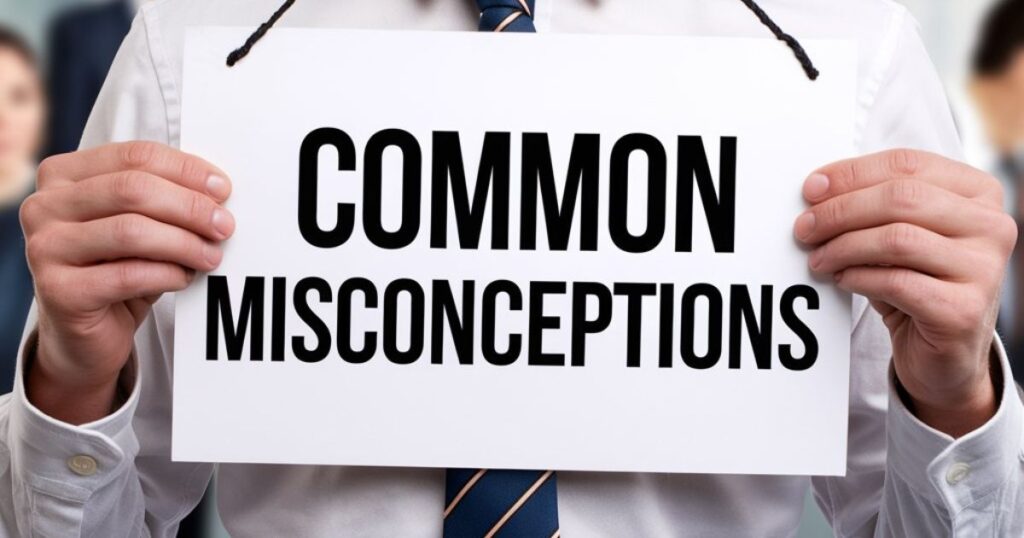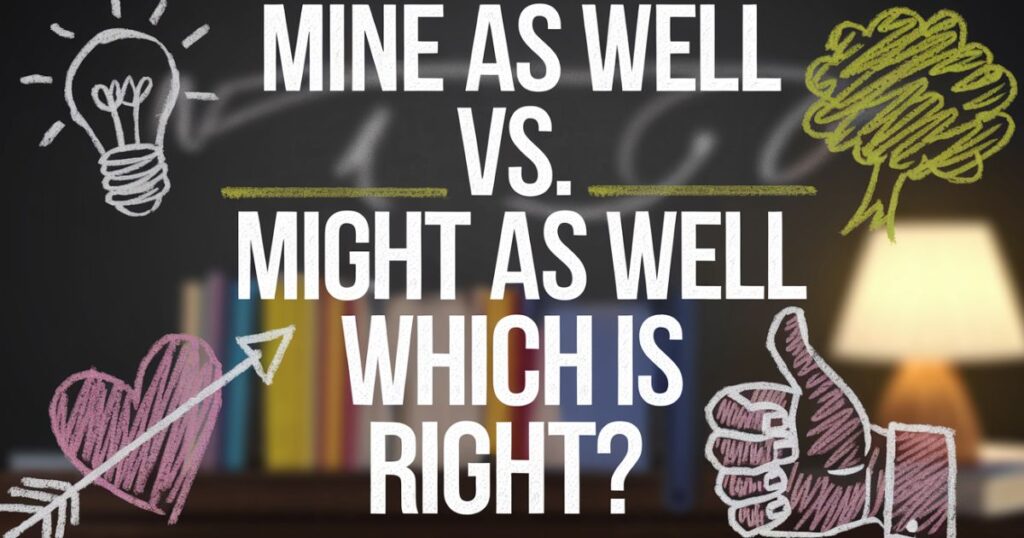When deciding between “Mine as Well vs. Might as Well Which Is Right?” many people get confused. Both phrases are commonly used in casual conversation, but one is technically more accurate than the other. In this article, we’ll dive into the differences between “mine as well” and “might as well” and explore which one is right for your sentences.
Understanding “Mine as Well vs. Might as Well Which Is Right?” can help you use the phrases correctly. While both can sound similar, “might as well” is the correct form in most situations. It’s important to know when to say “mine as well” or “might as well or mine as well” to avoid confusion. If you’re ever unsure, consider whether you’re implying a suggestion or using the phrase in a more personal way, like “I mine as well” or “you mine as well.” By the end of this article, you’ll feel confident in choosing the right phrase for your needs.
Overview
The debate between “mine as well” and “might as well” is common, but only one is correct. The proper phrase is “might as well,” used to suggest a reasonable or logical action, like “We might as well leave early if the event is canceled.” This is key in “Mine as Well vs. Might as Well Which Is Right?”
“Mine as well” is an incorrect version, often mistaken due to similar sounds. It carries no real meaning in standard English but is frequently misheard or used in casual conversation. For clarity, always choose “might as well.” Whether it’s “mine as well or might as well” or “you mine as well,” stick with “might as well” in “Mine as Well vs. Might as Well Which Is Right?”.
Origins and Definitions
The confusion between “mine as well” and “might as well” often arises due to their similar pronunciation in casual speech. While “might as well” is the correct and meaningful phrase, “mine as well” is an error with no grammatical basis. This misunderstanding is central to “Mine as Well vs. Might as Well Which Is Right?”.
“Might as Well”
“Might as well” is the correct expression, used to suggest a logical or reasonable decision when no better option is available. It’s common in both informal and formal settings and emphasizes practicality or convenience.
Example:
“We’ve got time before the movie starts; we might as well grab a coffee.”
“Mine as Well”
“Mine as well” is incorrect and typically results from mishearing “might as well.” While phrases like “I mine as well” or “you mine as well” are sometimes spoken, they are not grammatically correct and should be avoided in writing or formal speech. To clarify, always use “might as well” in both casual and formal contexts, especially in the discussion of “Mine as Well vs. Might as Well Which Is Right?”.
Example:
Incorrect: “I joined you for lunch.”
Correct: “I might as well join you for lunch.”
“Mine as well” is used in the same contexts as “might as well.”
The phrase “mine as well” is often mistakenly used in the same contexts as “might as well,” but it is incorrect. For example, you might hear someone say, “I mine as well go home,” but the correct phrase is “I might as well go home.” Both phrases convey a similar meaning, but only “might as well” is grammatically correct.
Example:
Incorrect: “I mine as well leave now.”
Correct: “I might as well leave now.”
“Using “mine as well” makes your speech sound more casual.”
Using “mine as well” can make your speech sound casual, but it’s still grammatically incorrect. For instance, you might say, “We’re here already, we mine as well stay,” but the proper way to say it is “We’re here already, we might as well stay.” Stick to “might as well” for accuracy.
Example:
Incorrect: “We mine as well, just call it a day.”
Correct: “We might as well just call it a day.”
Read Also: 200+Sigma Male Instagram Captions to Showcase Your Strength
Common Misconceptions

Many people mix up “mine as well” and “might as well” due to how similar they sound in casual speech. However, these phrases are not interchangeable, and misunderstandings about their usage often lead to errors in both spoken and written English. Let’s address some common misconceptions with examples, particularly in the context of “Mine as Well vs. Might as Well Which Is Right?”.
1. “Mine as well” is interchangeable with “might as well.”
This misunderstanding arises because the two phrases sound alike. However, “mine as well” is grammatically incorrect and has no place in proper English.
Scenario:
Someone says, “If you’re going, I’ll join you.”
The correct version would be, “If you’re going, I might as well join you.”
2. “Mine as well” is acceptable in formal writing.
Many assume “mine as well” can be used in professional contexts, but this is incorrect. It reflects a misunderstanding rather than proper grammar.
Scenario:
A student writes, “I will complete the assignment early.”
The accurate phrasing should be, “I might as well complete the assignment early.”
3. “Mine as well” is an old expression.
Some believe “mine as well” has historical roots, but it’s purely a modern error that has gained traction due to mishearing.
4. Both phrases mean the same thing.
A common misconception is that “mine as well” and “might as well” are interchangeable, but only one phrase is correct.
5. “Might as well” and “may as well” are the same.
Though similar in meaning, these phrases differ in usage. “Might as well” is more casual, while “may as well” is slightly formal.
Correct Usage in Context
Using “might as well” correctly can make your speech or writing clearer and more precise. It’s a versatile phrase used in various situations to suggest actions, accept circumstances, or express indifference.
Always ensure you’re not confusing “mine as well” with “might as well” since the former is incorrect. Below are some key contexts where “might as well” is appropriately used in the discussion of “Mine as Well vs. Might as Well Which Is Right?”.
1. Using “Might as Well” for Suggestions
When suggesting an action that seems as good as any other option, “might as well” is often used to propose a reasonable course of action.
Example:
“We’ve come this far; we might as well finish the project today.”
2. Using “Might as Well” for Accepting a Situation
It’s also used when accepting a situation, often with a sense of resignation, when there’s no better choice.
Example:
“It’s raining outside, so we might as well stay inside and watch a movie.”
3. Using “Might as Well” for Indifference
When you don’t have a strong opinion and are okay with whatever choice is made, you use “might as well.”
Example:
“I’m fine with either restaurant; we might as well go to the one closest to us.”
4. Using “Might as Well” for Waste of Time
It can express that not doing something would be a waste of time, suggesting that the action is worth taking.
Example:
“You’ve already put in an hour, so you might as well finish the task.”
5. Using “Might as Well” for Subtle Requests
It’s a polite way to make a suggestion or a gentle request, often sounding less demanding.
Example:
“If you’re passing by the store, you might as well pick up some bread for me.”
Tips for Avoiding Mistakes

To avoid mistakes, always use “might as well” instead of “mine as well.” Practice the correct usage in various contexts, and remember to check your writing for accuracy in both formal and informal settings.
1. Always use “might as well” instead of “mine as well.”
“Might as well” is the correct phrase. Avoid using “mine as well”, as it is grammatically incorrect.
2. Use the phrase when indicating a reasonable or convenient choice.
When suggesting an action with no better alternative, use “might as well.” This indicates that the action is as reasonable as any other.
3. Stick to “might as well” for both formal and informal contexts.
“Might as well” is suitable for both casual and professional situations. Never use “mine as well” in formal contexts.
4. Avoid using “mine as well” in any form of communication.
“Mine as well” should not be used in writing or speech. Stick to “might as well” for correct grammar.
5. Remember the word “might” in the phrase indicates possibility.
The word “might” in “might as well” suggests a possibility. This is key to the phrase’s proper use.
6. Don’t confuse “might as well” with “may as well.”
Although similar, “might as well” and “may as well” are not interchangeable. Use “might as well” for suggestions.
7. Practice the phrase in context.
To use “might as well” correctly, practice it in different sentences. This will help avoid using “mine as well” by mistake.
8. Double-check formal writing.
Before finalizing formal documents, ensure you’ve used “might as well” correctly. Never substitute it with “mine as well.”
9. Listen for the correct usage.
Listening to others will help you understand how to use “might as well” correctly. It will also help you avoid saying “mine as well.”
10. Ask for feedback.
If unsure, ask others to check your usage of “might as well.” They can point out any mistakes like saying “i mine as well.”
Broader Language Insights

Broader language insights show how cultural, regional, and educational influences shape the usage of phrases like “might as well” across the globe. These factors lead to variations in language preferences, formality, and expression in different countries.
Cultural Influence on Language Usage
Cultural backgrounds significantly shape language preferences, leading to unique uses of phrases. In the USA, “might as well” is widely used in both casual and formal settings, while in the UK.
There may be a preference for more formal variations, such as “may as well,” especially in professional contexts. In discussions around “Mine as Well vs. Might as Well Which Is Right?”, this regional difference plays a key role in how the phrases are used.
USA: “We might as well go now, it’s getting late.”
UK: “You might as well wait until we hear back from them.”
Formality Levels
Formality in language varies across regions. For instance, in Canada, “might as well” is often used in casual speech but can also appear in formal conversations. In contrast, in the Philippines, while English is spoken casually, formal situations require more structured language, affecting how phrases are used. This highlights the importance of understanding “Mine as Well vs. Might as Well Which Is Right?” to ensure appropriate use across different contexts.
Canada: “You might as well finish this task today.”
Philippines: “We might as well head home now, it’s getting late.”
Language Evolution and Local Variants
In countries like India, where English has evolved with influences from British English and local dialects, phrases like “might as well” are widely understood. However, regional languages often lead to unique variations, especially when discussing phrases like “Mine as Well vs. Might as Well Which Is Right?”.
In informal speech, more direct expressions or different sentence structures may be used, affecting how phrases like “mine as well” or “might as well” are perceived.
India: “We might as well stay here a bit longer.”
Philippines: “Might as well, but let’s check if it’s alright first.”
Global Spread and Media Influence
American media has popularized phrases like “might as well” in countries like the Philippines and India. However, the UK still favors more traditional expressions. In the debate of “Mine as Well vs. Might as Well Which Is Right?”, regional variations shape how these phrases are used.
USA: “You might as well give it a try.”
UK: “You might as well do it, but check with them first.”
Canada: “Might as well, let’s get this over with.”
Philippines: “We might as well leave now, it’s getting late.”
Impact of Education and Language Instruction
Countries with strong English education systems, such as India and the Philippines, often demonstrate a higher understanding of grammatical rules. This awareness helps people distinguish between “might as well” and “mine as well.” In Canada, the blend of French and English may influence usage, while the UK sticks to its own established language norms.
USA: “It’s getting late, we might as well leave.”
UK: “You might as well leave now, it’s late.”
India: “We might as well finish the task today.”
Philippines: “Might as well head home now, it’s getting late.”
Canada: “We might as well finish this up now, no point in delaying.”
“Might as Well” vs. “Mine as Well” Across Countries
| Country | Common Usage | Preferred Phrase | Context of Use | Example |
| USA | “Might as well” | “Might as well” | Casual, formal, and everyday use | “We might as well leave now, it’s getting late.” |
| UK | “Might as well” | “Might as well” | Both casual and formal settings | “You might as well wait here until we hear back.” |
| Canada | “Might as well” | “Might as well” | Casual and formal contexts | “Might as well finish it now, no point in delaying.” |
| India | “Might as well” | “Might as well” | Casual, everyday use, and professional | “We might as well finish this task today.” |
| Philippines | “Might as well” | “Might as well” | Informal, everyday use | “Might as well head home now, it’s getting late.” |
| Australia | “Might as well” | “Might as well” | Casual settings | “We might as well go to the beach now, the weather’s great.” |
| South Africa | “Might as well” | “Might as well” | Casual, formal, and educational use | “You might as well study for the exam now.” |
FAQ’s
What is the difference between “Mine as Well” and “Might as Well”?
“Might as well” is the correct phrase to use. “Mine as well” is a common mistake in “Mine as Well vs. Might as Well Which Is Right?”
Which one is grammatically correct, “Mine as Well” or “Might as Well”?
“Might as well” is the grammatically correct phrase. “Mine as well” should be avoided in “Mine as Well vs. Might as Well Which Is Right?”
Can I say “Mine as Well” in my sentences?
It’s best to use “Might as well” instead. “Mine as well” is not typically correct in “Mine as Well vs. Might as Well Which Is Right?”
When should I use “Might as Well”?
Use “Might as well” to suggest a choice. It’s the proper phrase in “Mine as Well vs. Might as Well Which Is Right?”
Why is “Might as Well” more common?
“Might as well” sounds more natural and is the correct form. “Mine as well” isn’t used in “Mine as Well vs. Might as Well Which Is Right?”
Conclusion
In conclusion, when it comes to “Mine as Well vs. Might as Well Which Is Right?” the correct choice is usually “might as well.” While “mine as well” may sound natural in conversation, it’s technically not the right form. Knowing the difference between “mine as well or might as well” can help you speak more clearly and correctly. To sum up, “might as well” is the go to phrase in most situations.
So next time you’re wondering whether to use “mine as well” or “might as well or mine as well,” remember that “might as well” is typically the right option. Whether you say “I mine as well” or “you mine as well,” it’s essential to stay mindful of which phrase fits the context. Now that you know the difference, you can confidently use “Mine as Well vs. Might as Well Which Is Right?” in your conversations.






